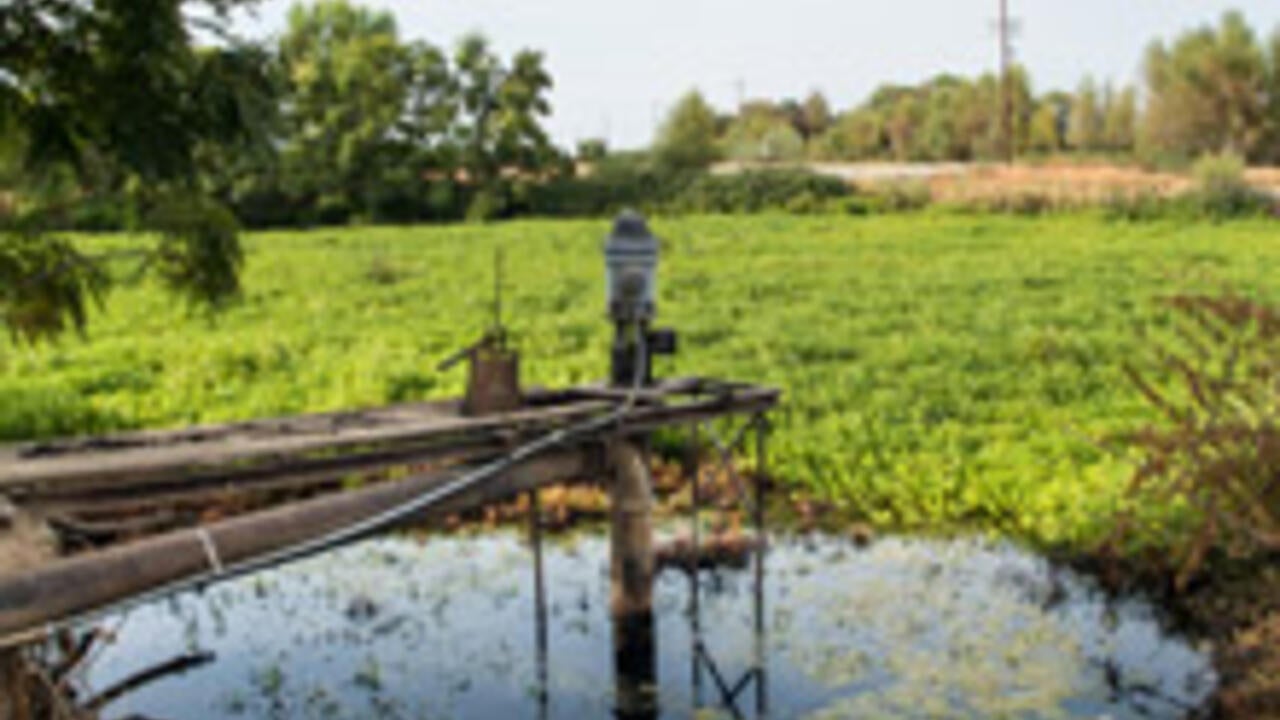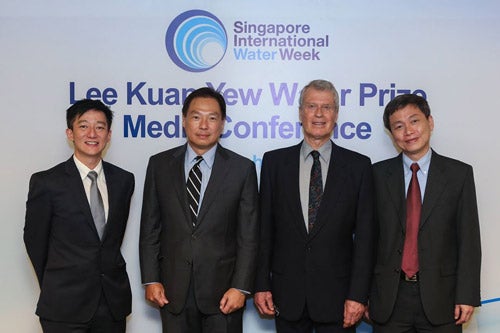
Global groundwater expert awarded Lee Kuan Yew Water Prize
Distinguished Waterloo hydrologist honoured for outstanding contributions to the world’s water challenges

Distinguished Waterloo hydrologist honoured for outstanding contributions to the world’s water challenges
By Victoria Van Cappellen Faculty of ScienceJohn Cherry, a distinguished professor emeritus in the University of Waterloo’s Faculty of Science, has been awarded the 2016 Lee Kuan Yew Water Prize, a top international water prize worth more than $280,000 CDN. Organizers of Singapore International Water Week made the announcement March 21, in conjunction with World Water Day.
“This is wonderful news,” says Earth and Environmental Sciences Chair Bill Taylor. “John Cherry is one of the outstanding faculty members who made the Department of Earth and Environmental Sciences a world leader in the area of hydrogeology.”

From left: Mr Bernard Tan, Managing Director of Singapore International Water Week; Mr Peter Joo Hee Ng, PUB Chief Executive; University of Waterloo professor John Anthony Cherry; and Mr Harry Seah, PUB Chief Engineering and Technology Officer. Image credit: Singapore International Water Week
Cherry is the seventh laureate and the first Canadian to receive the prize in honour of his contributions to groundwater management and lifelong dedication to the protection of groundwater resources. It’s estimated groundwater comprises 95 per cent of the planet’s useable freshwater.
He will be presented with the award at the Lee Kuan Yew Prize Award Ceremony and Banquet following his Singapore Water Lecture on July 11th as part of the Singapore International Water Week conference.
A professor and world-renowned hydrologist in the department of Earth and Environmental Sciences for more than three decades, Cherry was best known for co-authoring groundwater hydrology’s standard textbook Groundwater with R.A. Freeze in 1979.
He joined the faculty at the University of Waterloo in 1971 as one of three pioneering hydrologists hired by former Earth Sciences chair and Science Dean Robert Farvolden. At the time, field research on the migration and fate of contaminants in groundwater and their remediation was in its infancy.
Cherry actively participated in the development of technologies for improving groundwater monitoring and remediation. In the 1980s, he established the Borden Groundwater Field Research Facility. The site continues to be used by international researchers to discover major scientific insights about groundwater flow, as well as the movement and fate of subsurface contaminants.
His major scientific findings include demonstrating the forces controlling groundwater flow and contaminant transport within confining aquitard layers, knowledge which policymakers have incorporated into selecting safe sites for hazardous waste disposal.
He also developed better ways to deal with dense non-aqueous phase liquids (DNAPLs), a class of common yet difficult to remediate industrial contaminants because of their unusual behavior. His targeted in-situ treatment and risk management approaches resulted in new groundwater remediation guidelines in the United States, replacing expensive, ineffective pump-and-treat remediation.
Although he retired from Waterloo with the title Distinguished Professor Emeritus in 2006, he remains active in research, particular monitoring and protecting groundwater resources near hydraulic fracking operations. Fractured rock formations are the least understood of all groundwater systems, but are particularly susceptible to contamination.
Among his many career awards, he is a Fellow of the Royal Society of Canada and a Foreign Member of the U.S. Academy of Engineering, as well as a Thompson Reuters Highly Cited Researcher.
“It is because of the legacy of John Cherry and others that the University established the Water Institute,” said Water Institute Director Professor Roy Brouwer. “The Lee Kuan Yew Water Prize honours some of the most outstanding contributions towards solving the world’s water challenges.”
Cherry is currently the Director of the University Consortium for Field-Focused Groundwater Contamination Research, Associate Director of G360 Centre for Applied Groundwater, and Adjunct Professor at the University of Guelph.
Professor Cherry will be delivering this year’s Adrian Smith Lecture, hosted by the Department of Earth and Environmental Sciences on Friday, April 1st.
Preview image credit: U.S. Department of Agriculture

Read more
Here are the people and events behind some of this year’s most compelling Waterloo stories

Read more
Meet five exceptional Waterloo graduate students crossing the convocation stage as Class of 2025 valedictorians

Read more
Meet the 14 exceptional students representing Waterloo’s newest grads
The University of Waterloo acknowledges that much of our work takes place on the traditional territory of the Neutral, Anishinaabeg, and Haudenosaunee peoples. Our main campus is situated on the Haldimand Tract, the land granted to the Six Nations that includes six miles on each side of the Grand River. Our active work toward reconciliation takes place across our campuses through research, learning, teaching, and community building, and is co-ordinated within the Office of Indigenous Relations.